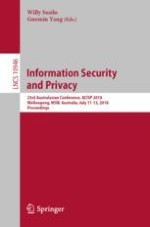2018 | OriginalPaper | Buchkapitel
Verifiable Secret Sharing Based on Hyperplane Geometry with Its Applications to Optimal Resilient Proactive Cryptosystems
verfasst von : Zhe Xia, Liuying Sun, Bo Yang, Yanwei Zhou, Mingwu Zhang
Erschienen in: Information Security and Privacy
Aktivieren Sie unsere intelligente Suche, um passende Fachinhalte oder Patente zu finden.
Wählen Sie Textabschnitte aus um mit Künstlicher Intelligenz passenden Patente zu finden. powered by
Markieren Sie Textabschnitte, um KI-gestützt weitere passende Inhalte zu finden. powered by
